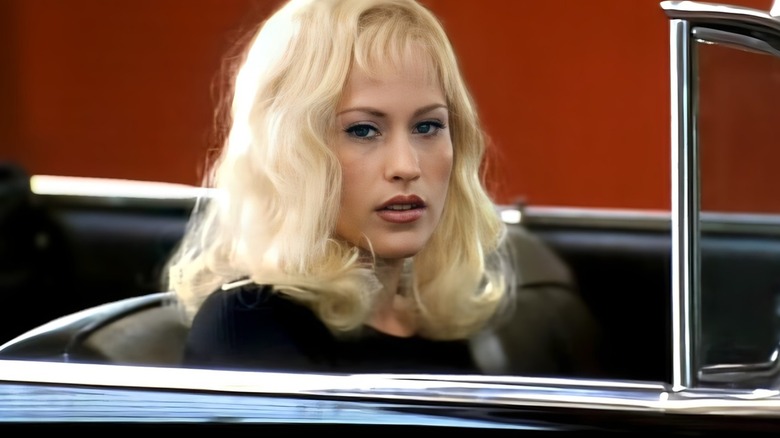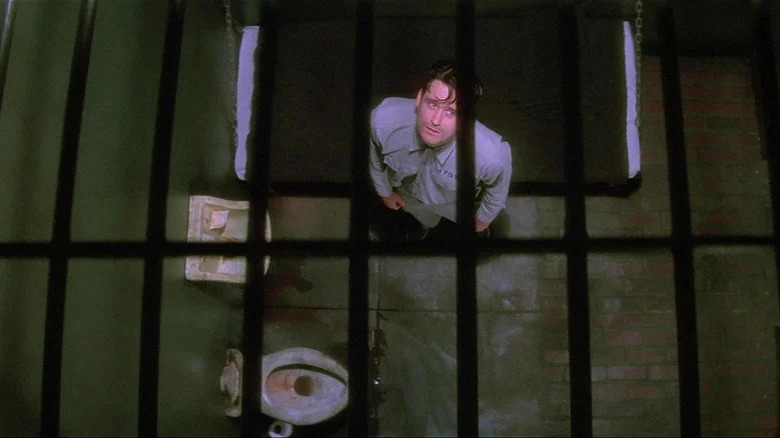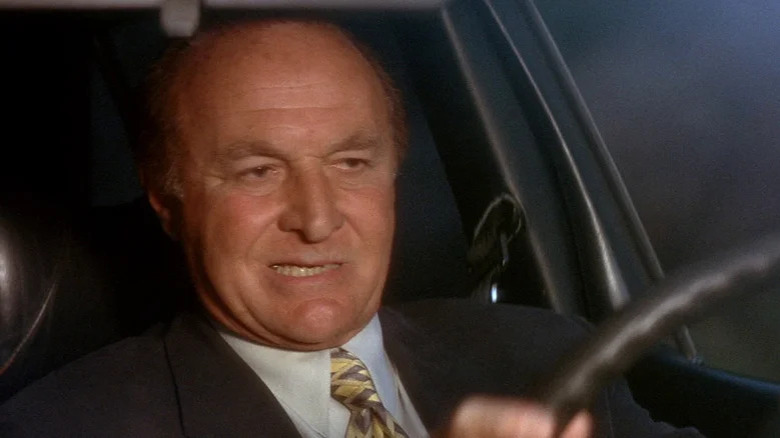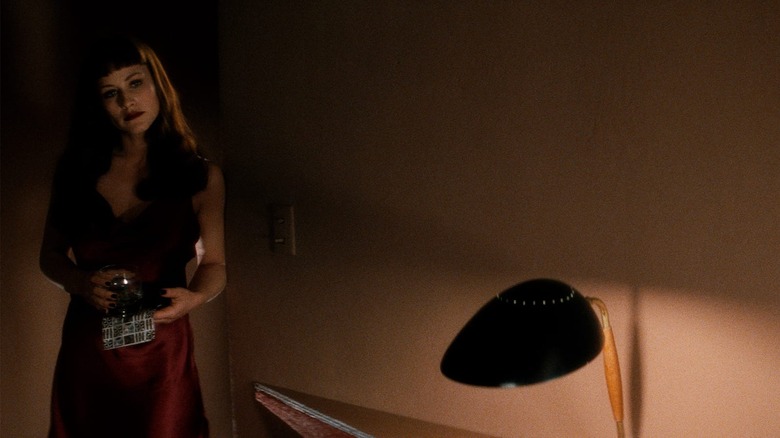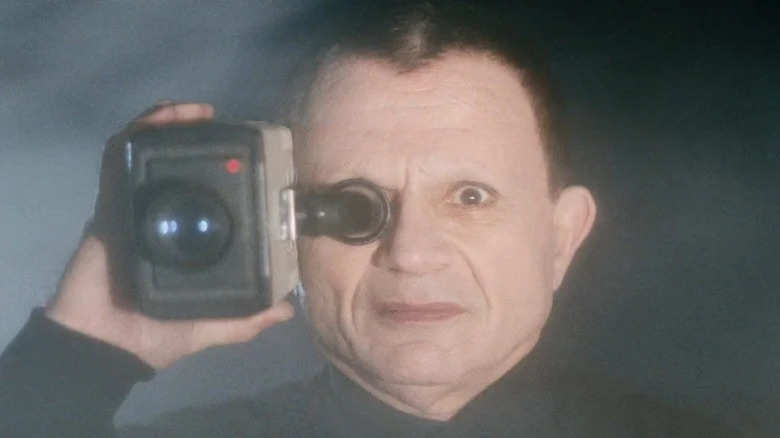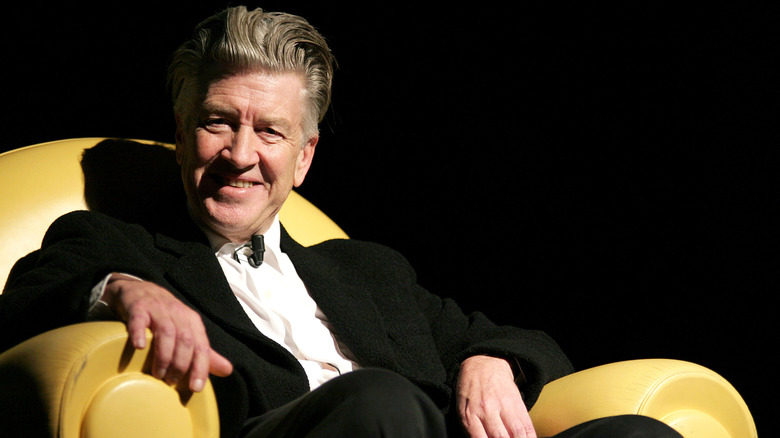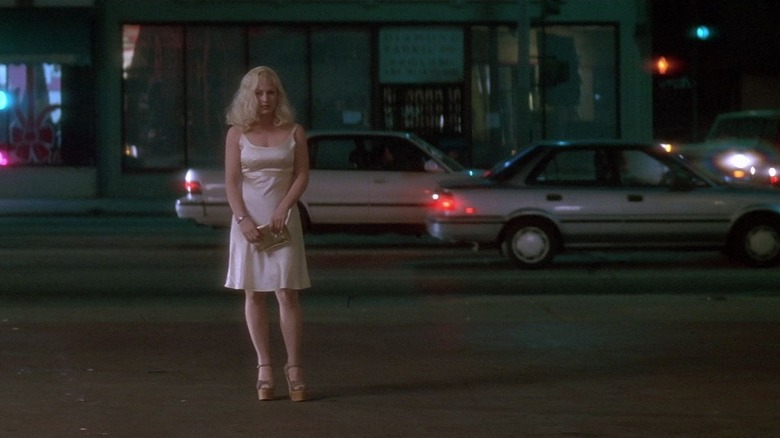Lost Highway Ending Explained: The Utter Failure Of Masculinity
We may receive a commission on purchases made from links.
David Lynch's 1997 masterpiece "Lost Highway" is an oblique nightmare that swirls haphazardly around themes of identity and sexual insecurity. Its main character — who may be two main characters — is lost in a shadowy noir world of demonic cameramen, underground porn, creepy faceless stalkers, and life-threatening gangsters. Lynch's films are typically surreal and philosophically distant, but they can often contain a great deal of humanity and recognizable facets of warmth. One might think of Sailor and Lula from "Wild at Heart" — two of Lynch's most memorable characters — or some of the more subtly funny moments in "Eraserhead" (the delivery of "Okay, Paul!" is a scream). When David Lynch passed away in 2025, his fans remembered him as a kindly, grandfatherly figure, passionate about his art.
"Lost Highway," however, may be Lynch's coldest film. It's filmed largely in inky shadows and sterile, ultra-clean interiors. The natural world is a black hole, and the man-made world is an antiseptic call built to house filth and iniquity. The dominant image of "Lost Highway," the one put on the movie's poster, is a forbidding stretch of road rocketing by at an imperceptible speed, surrounded by night. Life is nothing but a constant, blind, hypersonic rush across the alkali flats to oblivion.
The only companion in that nightmare world is regret. Regret, impotence (in both senses of the term), and failure. And the knowledge that your pain and insecurity will not go unnoticed. Life on the lost highway is like Hell.
/Film rated "Lost Highway" low on Lynch's filmography, but that's not necessarily a dig at the movie. It's in great company. It's also one of the best films of 1997.
David Lynch's look at masculinity run afoul
"Dick Laurent is dead." So says the mysterious voice into Fred's intercom one morning.
A brief rundown on the story: Fred (Bill Pullman) is a jazz saxophone player whose solos are chaotic and sweaty. He lives with his impeccably beautiful and emotionally distant wife Renee (Patricia Arquette). Their lovemaking is unsatisfying, and Fred cannot perform. He is given a condescending pat on the back by his wife who whispers "there, there," compounding his masculine embarrassment on the issue. Yes, a lot of the anxiety on display in "Lost Highway" stems from Fred's inability to get it up.
The couple receives a series of videocassettes, left in envelopes on their doorstep. At first, the tapes are videos of their house's exterior. Later cassettes depict someone sneaking into their home and filming them while they sleep. The final cassette is a film of Fred murdering Renee, an event he has no memory of. Fred is sent to prison.
In prison, Fred ... transforms. He becomes a younger man named Pete (Balthazar Getty). There is no explanation for the transformation. Pete is logically released from prison and allowed to live his life where he has parents, a girlfriend (Natasha Gregson Wagner), and a job as a mechanic. As a mechanic, Pete attracts the eye of a gangster's moll named Alice who is also played by Patricia Arquette. The gangster, played by Robert Loggia, is an imposing and terrifying presence who beats up a man for tailgating. "Lost Highway" doesn't possess much levity, but the tailgating scene is genuinely funny.
Why did Fred become Pete in Lost Highway?
Why did Fred transform? One could interpret the transformation as a fantastical re-claim of pathetic masculinity. Fred, in being unable to perform sexually, imagined himself as a younger, more virile man with a manly job — he's a mechanic! — who immediately draws the sexual attention of both a girlfriend and an untouchable, dangerous femme fatale. Pete is being followed by a pair of mysterious Feds, and even they are impressed by how often Pete gets laid.
The plot of "Lost Highway" then begins to descent into film noir territory (and we know film noir), involving Pete in a dark ring of underground porn production. To offer some legit criticism of "Lost Highway," the porn plot isn't as shocking to audiences as David Lynch seems to think it is. Eventually, Alice and Pete will, like in "Gun Crazy," team up to commit crimes. Lives will be taken, and betrayals committed. Pete, after having been sold out and left to be humiliated, transforms back into Fred. As Fred, he returns to his old home and speaks the opening line of dialogue into his intercom. Dick Laurent is dead.
"Lost Highway" appears to be a wish fulfillment fantasy that is run afoul. Fred is concerned about his own masculinity, and his insecurities over his own genitals led him to symbolically "murder" his marriage. The only way out of his frustrations was to transform into a masculine ideal. For Fred, that ideal was a sullen 21-year-old greaser, a greaser who is cool enough to have an ultrasexual girlfriend as well as an ultrasexual mistress. He's not "cool" or "in control." Fred/Pete doesn't long for power or dominance. He only longs for casual, natural acceptance and adoration for being a sullen greaser.
Lost Highway explores themes of voyeurism and vulnerability
The problem with Fred's ideal masculine image is that it also must necessarily involve violence. The typical view of machismo is that it carry with it an element of danger and death. A "badass" is — to offer a base definition — merely someone capable at causing harm to others. Living in a manly world will necessitate suffering. Someone will die. Killing will occur. In a manly world of noir fantasy, one will inevitably be betrayed.
In this way, "Lost Highway" bears a strong resemblance to David Fincher's 1999 film "Fight Club," a film /Film has also smartly analyzed.
Additionally, "Lost Highway" argues that being seen and observed is tantamount to being emasculated. When someone's watching, you become vulnerable. One cannot remain cool unless they stay mysterious, kind of in the shadows. Throughout "Lost Highway," Fred/Pete find themselves on camera. Either he is on the cassettes at the film's opening, or he is being filmed out in the open by the Mystery Man (Robert Blake). The idea of being recorded every moment of every day is not necessarily a pinion of anxiety in the 2020s, but in 1997, it was the very height of paranoia. Not to become a dull Freudian, but the Mystery Man, in holding the camera, might symbolize Fred/Pete's superego. Once he finds he is observed, Fred can no longer pretend he is anyone else. He's a sad man who failed his marriage.
See also: Michael Haneke's 2005 film "Caché," as it deals with similar themes of voyeurism and the vulnerability that a videocassette creates. There is nothing worse for a guilty soul than to know you are being watched.
What does the Mystery Man represent?
The Mystery Man could represent Freud's superego, but one should hesitate to make such a comparison, as David Lynch hated that kind of one-to-one interpretation of his work. For Lynch, what we saw it what we got, and further discussion only hurt a work of art. The Mystery Man is, then, in a very literal sense, someone who watches, judges, accuses, and delivers guilt into Fred's life.
Once observed and made naked, Fred's only choice is to get in the car and drive eternally down the lost highway, the police on his tail. Like a grindhouse Sisyphus, he is eternally condemned to drive away from his fears and insecurities, never resting, never able to let them go. Fred is in Hell. Or perhaps insane. Either way, it's not a good ending for Fred.
Without realizing it, Lynch may have also been making a drama of his own tumultuous married life. Lynch was married four times since 1968, with one of his marriages — to longtime collaborator Mary Sweeney — lasting less than a year. "Lost Highway" is a bold and glorious aesthetic exercise — it's easily Lynch's best-looking movie — but also may reveal insecurities the filmmaker had about his marriages and the failure thereof. He could very well have been, unwittingly, making a film about his own masculine insecurities.
Recall that the late 1990s were, if movies are to be any indicator, also a time of great reckoning. Old world, post-War American institutions were being examined and torn down in films like "Fight Club," "Pleasantville," and "American Beauty" (a seminal text of American dissatisfaction in the 1990s). "Lost Highway" is Lynch's version of that reckoning.
What did David Lynch say about the ending of Lost Highway?
David Lynch hated talking about his own films. As mentioned, he eschewed verbal analysis and hated critics who interpreted his work (I should perhaps pause to apologize to the late filmmaker for the existence of this very essay). Lynch, instead, described his film in broad, abstract terms. He described "Eraserhead" as "a dream of dark and troubling things," and "Inland Empire" as "a woman in trouble."
Lynch did talk about "Lost Highway" a little bit in a 2013 interview with Dominic Wells, published on Wells' website. Wells suggested to Lynch that the Mystery Man represented not the superego, but an aspect of Fred's id, a creature conjured from within his subconscious. When asked is he was warm, Lynch only responded with "Yeah." Wells also suggests, as I did above, that Fred is trapped forever on the lost highway, and that he is doomed to repeat his self-defeating cycle over and over. To that, Lynch replied, "Well, maybe not forever and ever, but you can see how it would be a struggle. Yeah, that's it." Lynch later added that "Lost Highway" "is a fragment of the story. It's not so much a circle as like a spiral that comes around, the next loop a little bit higher than the one that precedes it."
Of course, because "Lost Highway" ends where it begins — almost like James Joyce's "Finnegans Wake" — one can easily extrapolate that it is a story about recurrence. One might be tempted to say it's a Buddhist text about reincarnation, but "Lost Highway" is more like a bleak prison where each reincarnation is the same as the last one. In that sense, "Lost Highway" is more like Nietzsche's warning about eternal recurrence. If we're to assume reincarnation is real, Nietzsche said, then live each life as if you will repeat it in exactly the same way each time. If you make horrid mistakes, give up your strength, and succumb to weakness, you will be doomed to do that forever. Live with strength instead.
What did Patricia Arquette say about the meaning of Lost Highway?
Patricia Arquette also had her own theories about "Lost Highway," and she had no compunctions about laying on interpretations. In a 2024 interview with Variety, Arquette felt that the film wasn't about withered masculinity, but its powerful twin misogyny.
"I would ask David: 'Am I playing two characters, am I playing a ghost?' He would say: 'What do you think, Patrish?' It's a woman looked at through the distorted view of a psychotic misogynist. [Fred] hates women, he doesn't quite trust [Renee], even though she is his wife. He kills her, but can't remember it, then he recreates himself as this virile young man and meets her again. And now, she actually wants to f*** him, and she is in love with him. But even in this version, she is a dirty whore."
Fred's views, Arquette continues, are ancient, springing from very, very old stories wherein men are the victims of villainous women. She said:
"In this man's mind, a woman is always the monster. No matter what. I thought about Jezebel and Salomé for this part, all these bad girls of the Bible."
Arquette had an issue playing such a demure character, as her character from Tony Scott's "True Romance" was also wholly deferent to her boyfriend. She didn't like that.
This sort of comment, of course, is the kind where Lynch might say that she was "close," or that it's "an interesting way to look at it," but he would never, ever "confirm" an interpretation. His mind simply didn't work like that. But Arquette does seem to be close to something, or at least tapping into something vital about her characters. Like all of Lynch's films, "Lost Highway" is layered and labyrinthine, and the pleasures of the film come from being lost in the mystery, not finding the exit.
